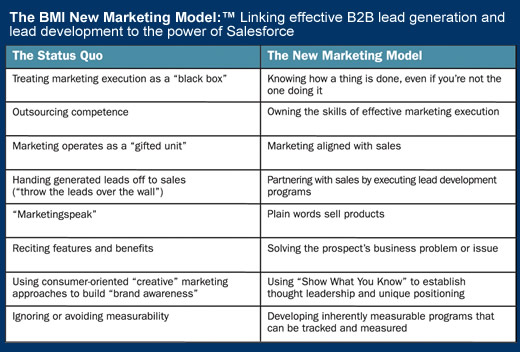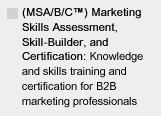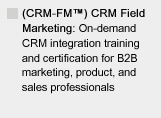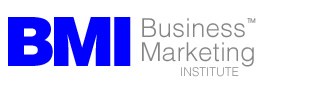MAKE SURE YOU CONTINUE TO RECEIVE EACH ISSUE OF TUESDAY MARKETING NOTES—CLICK HERE TO RENEW YOUR FREE SUBSCRIPTION
On-Demand CRM and the New Marketing Model™: What on-demand CRM Means to You and What You Need to Know as a B2B Marketing Professional
By Eric Gagnon
As marketing professionals, we've all heard about on-demand CRM systems now used by many B2B sales teams across many different markets and industries.
If you don’t know much about on-demand CRM, or you don’t think you need to know about it, read on anyway, because even if your company’s sales team isn’t using on-demand CRM, or any other CRM system, I think you’ll find some good information here that’s going to be important to your career as CRM capabilities expand to marketing.
On-Demand CRM: Universally Accessible CRM for Companies Operating in Business Markets
What makes on-demand CRM unique is that it is a fully Web-based, far less expensive alternative to the very complex, costly, software- and training-heavy CRM systems offered by the usual players in this business. on-demand CRM gives sales teams a very affordable, easy to use, yet very powerful, online tool that dramatically increases their productivity in their ongoing interaction and execution of the sales process: Communications with prospects, and associated sales management functions, such as sales report generation, sales team communications, document storage, and measurement features, such as estimates of potential sales revenue “in the pipeline.”
When companies implement on-demand CRM, its biggest benefit to a company’s sales function is the massive increase in productivity and efficiency on-demand CRM brings to their sales teams, as they utilize the powerful contact management and communications features of on-demand CRM to streamline the interactions between sales reps and their prospects during the long sales cycles most companies experience in the B2B field. These positive changes happen both when on-demand CRM replaces older, clunkier CRM systems which are always difficult to get salespeople to use and also when they replace haphazard, catch-as-catch-can manual or spreadsheet-based systems still used by some sales operations.
What On-Demand CRM Means to You as a Marketing Professional
To marketing professionals operating in a rapidly-changing business environment, on-demand CRM is much more than a highly efficient contact manager, networking tool, or reports generator for your sales team. When on-demand CRM is implemented in a company, it often becomes a catalyst for profound changes in a company’s marketing function and a major impact on your role as a marketing professional.
Companies using on-demand CRM gain the advantage of access to extreme measurability of all functions in their sales process. For example, sales executives can accurately view the duration of the interactions between their reps and prospects, measure their average sales cycle length, and, most important, get a clear view of all near- and longer-term sales and new business opportunities in their sales pipeline.
On-demand CRM becomes the platform that empowers every interaction between a company’s sales team and their prospects. It transforms the sales cycle into a productive, more systematic process, and provides easy measurability of this productivity, measured in sales dollar volume from deals closed for every sales rep, with all of these key measurements easily viewed and accessible to senior management in a wide variety of Web-based report and “dashboard” formats, readily accessible in on-demand CRM.
On-Demand CRM is Also the Catalyst for Re-Engineering of the B2B Marketing Process
Once they begin using on-demand CRM, sales executives and company CEOs alike, now accustomed to getting accurate daily reports on contacts made, new accounts closed, and potential sales in the pipeline, start paying very close attention to whether or not the activities in the company’s marketing program are contributing to sales by providing an adequate, measurable return on expenditures for ads, mailings, trade shows, and other B2B marketing activities.
As on-demand CRM brings the focus of measurement to bear on company marketing programs, many activities in a company’s marketing plan may not measure up. They won’t generate sufficient returns when measured by the standard ROI benchmarks used in other aspects of company operations, like sales, finance, or operations. This explains why many B2B marketing articles are being written these days about the quest for (or lack of) “measurability” or “metrics” in marketing, which belies the fact that most marketing isn’t measured because it’s not generating sales leads.
To Get Marketing Measurability in CRM, Build Better Marketing Programs that Can Be Measured
And here’s the rub: on-demand CRM applied to an underperforming B2B marketing program easily reveals these major flaws of lack of measurability and poor sales response. If you’re practicing marketing as usual in a company using on-demand CRM, there may not be much to measure in on-demand CRM because the marketing program hasn’t been optimized to generate a sufficient measurable return—in the form of sales leads—in the first place.
While it’s true that some marketing activities may be difficult to measure, better measurement through on-demand CRM means greater pressure on you to develop marketing programs that show measurable results—sales leads—and this means a lot more than knowing how to calculate return on investment in on-demand CRM, or generating a fancy marketing dashboard.
At a minimum, this means rebooting your marketing program, and rebuilding it to generate more leads for sales, and demonstrating, through measurement of ongoing lead development efforts (more on this below) that the leads generated by marketing are being profitably converted by the sales team. A marketer who says they can’t measure their marketing program really means to say that their marketing program isn’t generating sales leads, because if it was, it would already be generating enough leads to make its measurement worthwhile in on-demand CRM.
The larger point here is that efficient, accurate measurement of marketing programs is only the end result of a much larger process of developing marketing programs that generate measurable response—i.e., sales leads, the first vital element required to achieve marketing measurability in on-demand CRM. This process, which we define as the New Marketing Model, means re-engineering every aspect of business marketing programs to optimize them to generate strong sales response and meaningful ROI in on-demand CRM.

Better marketing, integrated with on-demand CRM under the New Marketing Model, means, first and foremost, optimizing every marketing activity to generate strong, measurable sales response—sales leads—from every single activity in your marketing program. This means using clear presentation to powerfully communicate your product’s most compelling features, advantages, and benefits persuasively to potential prospects in your market.
The good news is that the new marketing methods and media you use to generate sales leads in your company also happen to be easily measurable: Google AdWords online keyword search programs, links to dedicated landing pages on your company’s Web site, and even links to downloadable information premiums from targeted URLs in your print advertising and direct mail, allow you to readily measure sales response from these marketing activities.
Next, the New Marketing Model extends your role as a marketing professional beyond lead generation into lead development, a specialized, targeted marketing program that assists your company’s sales teams in their ongoing interactions with their prospects during the long sales cycles experienced in most B2B companies today. Lead development supports sales through a variety of e-mail messaging programs and other targeted marketing activities including development of “show what you know” information deliverables, such as white papers, case studies, and applications briefs to highlight your company’s unique knowledge, and to position your company as a thought leader in its market.
On-Demand CRM: Getting B2B Marketing Back to Its Most Important Role, Sales Support
The goal of your lead development program is to build trust in the prospect during their pre-purchase communications with your company’s sales rep, by positioning your company as the prospect’s best choice for solving their business problem or issue. Helping your sales team by building trust and credibility in the mind of the prospect is an especially important part of lead development: According to a 2004 study by the Aberdeen Group, a research firm, 70% of the influence in a business buyer’s final product purchase decision with a company is based on their trust in the company’s sales rep, more than any other aspect of a company’s marketing effort.
Better, more effective lead generation and ongoing lead development, brought about by CRM systems like on-demand CRM, mark a return for marketing professionals inside companies, and the agencies and consultants who serve them, to the most important role of any B2B marketing professional: Sales support.
In the tough economic times ahead, the marketer who gets ahead in their company (or with their client) is the one who demonstrates, over and over, the ability to execute strong, measurable marketing plans that serve sales by generating leads, and converting those leads to paying customers at measurably higher rates. Here, on-demand CRM is a powerful tool for helping you execute and measure these goals, but like any tool, it’s only as good as the professional who is using it. And better B2B marketing programs integrated with on-demand CRM begin by rebuilding your marketing program to generate the measurable sales response required to keep your sales team continuously working on new leads, prospects, and opportunities in their pipeline.
Eric Gagnon (eric@businessmarketinginstitute.com) is the author of the CRM Field Marketing Handbook, the core content study guide for the BMI CRM Field Marketing system.








